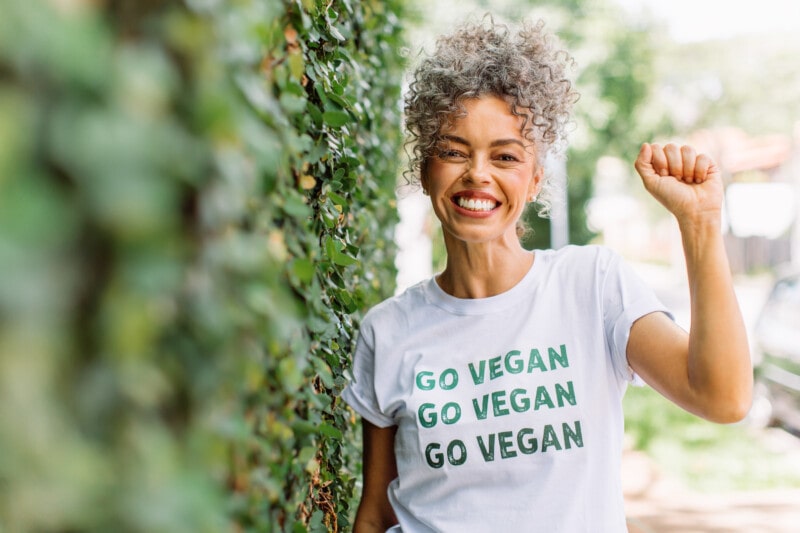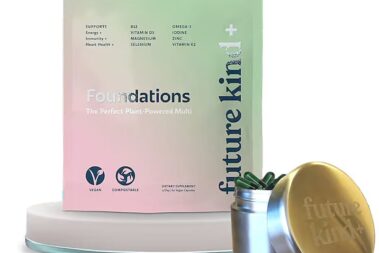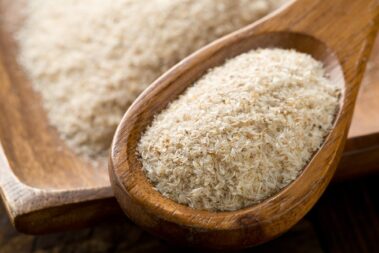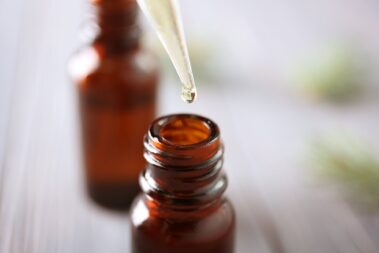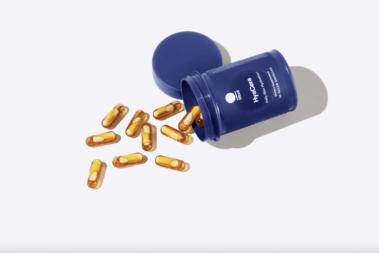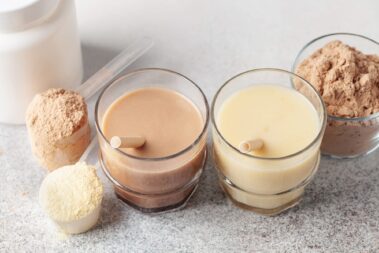A whole-food, plant-based diet can be designed to meet the majority of your nutrition needs well. However, there are a few nutrients that are more difficult to obtain from plant foods alone and are therefore important to get from a dietary supplement. Doing so helps to make sure you’re getting enough of all the nutrients that are critical to your health while thriving on plants. This article discusses which supplements should be considered on a vegan diet and why.
Table of Contents
What are the health benefits of a vegan diet?
A vegan diet is a way of eating that excludes animal products, such as meat, poultry, fish and seafood, dairy, eggs, and sometimes honey. Instead, people who follow a vegan diet will only eat plant foods. This includes a wide array of fruits, vegetables, nuts, seeds, legumes, and grains.
Following a vegan diet that emphasizes healthy whole foods has been shown to offer numerous health benefits.
For instance, while the standard American diet (characterized by high consumption of animal products and ultra-processed foods that are high in saturated fat, added sugar, and sodium) promotes systemic inflammation and chronic disease, a vegan diet does the opposite.
In fact, a growing body of evidence shows that people who follow a nutritionally adequate plant-based diet have a lower risk for―and better outcomes from―things like heart disease, type 2 diabetes, digestive diseases, obesity, kidney disease, and even certain cancers. This is largely thanks to the abundant vitamins, minerals, fiber, and antioxidants naturally found in plants.
Furthermore, plant foods are free from cholesterol and trans fats that can be problematic for health, with only a few sources of saturated fat (like coconut and palm oil), compared to the large amounts found in animal products.
Does a vegan diet require supplements?
Someone who doesn’t eat animal products should include certain supplemental nutrients to prevent nutritional deficiencies that can be more common on a vegan diet.
While some plant foods are fortified with these nutrients of concern, it’s not always enough to rely on these sources to meet your needs consistently.
Some people may prefer to use a multivitamin with minerals supplement, while others may choose to supplement certain nutrients individually. There’s no right or wrong way, as long as you’re meeting your needs.
Common vegan deficiencies and symptoms
Below are some of the nutrients that require more attention on a vegan diet. Supplementation should be considered for these nutrients to prevent deficiencies.
Vitamin B12
Vitamin B12 is the most important supplement for people on a vegan diet to take. Produced by single-celled organisms that live in soil, B12 is not found abundantly in whole plant foods. Furthermore, deficiency can be detrimental to your health.
Symptoms of vitamin B12 deficiency may present as fatigue, tingling limbs, and anemia, and progress to permanent nerve damage, deafness, blindness, and dementia. People who have vitamin B12 deficiency have also been found to have high levels of homocysteine, which may increase the risk for heart disease, stroke, and cognitive decline.
You can find B12 in some fortified foods, like certain plant milks and nutritional yeast. However, the amounts vary and you may not consume these items consistently enough to meet your needs. Fortunately, B12 supplements are generally inexpensive and easy to take.
To ensure adequate absorption, experts recommend taking B12 either 1-3 times per day or in very high doses 1-3 times per week. Below are a few options for adults over age 15:
- 1250-2500 mcg once per week
- 500-1250 mcg twice per week
- 250-1000 mcg three times per week
- 5-100 mcg once daily
- 1.2-5 mcg twice daily
- 0.8-1.3 mcg three times daily
See a more extensive list of recommended dosing regimens here.
Vitamin D
Known as “the sunshine vitamin,” vitamin D is produced when your skin is directly exposed to sunlight. However, many factors influence how much vitamin D is actually made, including age, sex, geographic location, time spent in the sun, and whether you’re wearing sunscreen or protective clothing.
At least 50% of the world is considered to be vitamin D deficient, which has been identified as a public health concern.
The reason that vitamin D is a recommended supplement on a vegan diet is that the best food sources of this nutrient are fatty fish, seafood, and eggs.
While some vitamin D is found in fortified non-dairy alternatives and certain UV-treated mushrooms, these sources are generally not consistent enough to maintain healthy blood levels. A vitamin D supplement is a convenient and effective alternative.
Note that while most D3 (cholecalciferol) is made using lanolin, the oil from sheep’s wool, there are vegan alternatives made using lichen. Vitamin D2 (ergocalciferol) is always vegan, but not as efficient in raising blood levels as D3.
Before adding a vitamin D supplement, it’s best to have your baseline level checked. This will tell you whether you need a maintenance dose or a dose to correct a deficiency.
For generally healthy people, a daily dose of between 600-1,000 IU of vitamin D3 (cholecalciferol) per day is sufficient. It’s not recommended to take more than 4,000 IU per day unless otherwise medically advised.
Signs of vitamin D deficiency can be tough to identify but may show up as fatigue, bone pain, muscle weakness, more illness, and feeling down. Long-term can lead to skeletal and muscular issues, immune problems, and a higher risk for chronic diseases, including osteopenia and osteoporosis.
Omega-3 Fatty Acids
Omega-3s are anti-inflammatory and important for brain and eye health. They include alpha-linolenic acid (ALA), eicosapentaenoic acid (EPA), and docosahexaenoic acid (DHA).
The best food sources of omega-3s are fish and seafood, but also flax, chia, and hemp seeds, and walnuts.
Your body can convert ALA to EPA and DHA, but the conversion rate is low.
Omega-3 deficiency can be difficult to identify but may present as irritated or dry eyes, brain fog, or joint pain.
And if you don’t eat many of the foods listed, vegan omega-3 supplements are also easy to find. Most are made with fish or krill oil, but there are also algae-derived options that are vegan. In general, it’s helpful to aim for a supplement that provides at least 250 mg of EPA + DHA per day.
Iron
Iron is needed for making healthy red blood cells and moving oxygen throughout the body. Plant foods contain non-heme iron, while animal foods contain heme iron. Heme iron is more readily absorbed, but that doesn’t mean you can’t get enough iron on a vegan diet.
It’s important to note that those on a vegan diet may want to aim for 1.8 times the recommended daily amount of iron to make up for the lesser bioavailability, which is 8 mg for men and 18 mg for women (or 14 mg and 32 mg, respectively).
Iron deficiency can present as anemia, extreme fatigue, weakness, pale skin, fast heartbeat, inflammation, brittle nails, and poor appetite. If left untreated, it can eventually lead to heart problems.
Some of the best plant-based iron sources include beans, peas, lentils, soybeans, quinoa, nuts, seeds, tomatoes, leafy greens, and dark chocolate. To enhance iron absorption on a vegan diet, pair these foods with vitamin-C-rich ones, like citrus fruits, berries, bell peppers, and broccoli.
If you don’t think you get enough iron from your diet, an iron supplement may be helpful.
Iodine
Iodine is a critical nutrient for thyroid health. It’s a delicate balance between not getting enough, which can cause hypothyroidism and goiter, and getting too much, which can cause either hypo- or hyperthyroidism.
The best place to get iodine is from food sources, such as iodized salt. Seaweed is also rich in iodine, but can be an inconsistent source, and even contribute too much if you eat it often.
So, if you don’t use iodized salt, you may want to consider an iodine supplement on a vegan diet. Just keep in mind that a supplement generally shouldn’t exceed 100% of the daily recommended needs, which is 150 mcg.
Calcium
Calcium is especially important for bone health and preventing osteoporosis. Recommended calcium needs for adults are 1,000 to 1,200 mg per day. Severe calcium deficiency can result in symptoms like tingling and numbness, muscle cramps and spasms, abnormal heart rhythms, and fatigue.
While we often hear that cow’s milk and dairy products are needed to meet calcium needs, these are not the only – or the best – sources of this nutrient.
On a vegan diet, the best places to find calcium are in dark leafy green vegetables. Some greens do contain compounds called oxalates, which can interfere with calcium absorption, so emphasizing low-oxalate ones is best. Examples include turnip greens, mustard greens, kale, bok choy, and collard greens.
Other good sources are calcium-fortified plant milks and calcium-set tofu.
Alternatively, you can take a calcium supplement that provides 300 mg once daily, with a meal for best absorption. There is mixed research on whether taking a higher dose supplement is problematic for health, but studies have suggested that calcium supplementation may be risky for heart health. It’s best to prioritize calcium from foods and err on the side of caution with supplemental doses.
Zinc
Zinc plays an important role in immune function. It even has antiviral properties.
Some good plant-based sources of zinc include oats, tempeh, legumes, nuts, seeds, and bread.
While most people on a vegan diet get enough zinc from foods, a modest supplement may be helpful if you find yourself getting sick more than usual.
If choosing a supplement, look for ones that provide approximately the recommended daily amount, which is 8 mg for women and 11 mg for men.
But where do you get your protein?
One of the most prolonged nutrition myths in history is that of complete versus incomplete proteins. The argument was that plants didn’t contain all nine essential amino acids and were therefore sub-standard or “incomplete” protein sources compared to animal products. Therefore, it was commonly recommended to pair certain plant foods together at the same meal to ensure adequate amino acid consumption, like beans and rice.
This myth has since been dispelled. All plant foods do contain all nine essential amino acids, it’s just that they may be limited in one or more of them (like lysine). Unless you only eat one source of plant protein for breakfast, lunch, and dinner, and nothing else, a plant-based diet is highly unlikely to make you protein deficient.
Just be sure to include sources of the more limited amino acids in your vegan diet. For instance, soy products and varieties of beans are good sources of lysine. As long as you’re eating a variety of plant foods, which is generally the idea of a healthy plant-based diet, your body will combine the amino acids it needs to create protein. No combining proteins required.
Furthermore, there are plenty of plant-based protein sources. Some of the richest ones include beans, peas, lentils, whole grains, nuts, seeds, seitan, and soy foods. Even fruits and vegetables, like broccoli and darky leafy greens, contribute some protein to your day.
Overall, regardless of what kind of diet you follow, becoming deficient in protein is incredibly rare as long as you’re getting enough calories.
All-in-one vegan supplement
Rather than taking individual nutrition supplements, some people prefer the convenience of taking a daily multivitamin.
A multivitamin is designed to help bridge micronutrient gaps that may exist in your diet, providing small amounts of vitamins and minerals.
However, for some people a multivitamin may not be necessary, especially if they eat a varied diet and take the necessary individual supplements on a vegan diet, like vitamin B12.
If you’re considering taking a multivitamin, take note of any other supplements you’re already taking, so you can be sure you’re not getting too much of any particular one. While nutrients from whole food sources aren’t a concern, getting large amounts from supplemental sources can be dangerous.
Special Case Supplements to Consider
In addition to the supplements discussed above, there may be other types of supplements you’re considering while on a vegan diet.
For instance, pregnant and lactation women have higher nutrient needs, particularly for things like folate and iron, so taking a prenatal vitamin is important. Don’t worry – there are many vegan prenatal multivitamins made for pregnancy and lactation.
And of course, adults aren’t the only ones who benefit from supplementation. Children who eat a vegan diet often need even more nutritional support, due to phases of selective eating and lower overall food intake than adults. Fortunately, there are plenty of good vegan multivitamins for kids to choose from.
Lastly, collagen is a popular supplement that has many people on a vegan diet wondering whether there’s a plant-based option. While there are no vegan collagen supplements yet, the next best options are products designed to help boost your body’s natural collagen production.
Takeaways
Overall, a healthy vegan diet can be designed to meet the majority of your nutrition needs. However, there are a few nutrients that benefit from extra attention for those on a vegan diet, including vitamin B12, vitamin D, and omega-3s, with the potential need for iron, iodine, zinc, and/or calcium depending on what your overall diet looks like. Some people prefer taking a multivitamin with minerals, while others like having the control of taking individual nutrient supplements. Either way, there are plenty of options.

About the Author
Lauren Panoff, MPH, RD is a registered dietitian nutritionist and writer with over a decade of experience in various areas of health and wellness.
After graduating from Colorado State University with her undergraduate degree in dietetics, Lauren completed her dietetic internship at the University of Michigan Health System. Shortly thereafter, she obtained her Master of Public Health degree at Michigan State University with a focus on the environmental health impacts of the standard American diet.
Lauren started her dietetics career at the University of Michigan Health System as a clinical dietitian, providing medical nutrition therapy and education to a wide array of inpatient and outpatient populations. She then moved on to become a staff dietitian at the Center for Eating Disorders in Ann Arbor, providing outpatient eating disorder counseling.
Following her clinical work, Lauren moved to public health, working for a third party product testing, inspection, and certification organization in Michigan. She worked as a project manager for dietary supplement testing and certification, and as a public health standards development liaison for the recreational water industry.
Writing has always been a passion for Lauren, and she decided to pursue it professionally once she became a parent. She specializes in elevating the plant-based niche, and now works primarily in content marketing and copywriting for a growing number of health and wellness brands.
She loves teaching others about the relationship between personal food choices and the larger world around us, in terms of public health, the environment, and animals. Her primary goal is to connect people with the information and resources they need for success.
Lauren brings a diverse background in nutrition science, consumer safety, and environmental health to her work, as well as a compassionate, open-minded, and realistic approach for readers and clients.
Outside of work, you can usually find Lauren doing something active, outdoors, in the kitchen, playing guitar, or doing creative projects with her kids.
- 11 Best Vegan B12 Supplements for 2023 - June 16, 2023
- 6 Best Vegan Kids Vitamins of 2024 - May 23, 2023
- 5 Best Vegan Digestive Enzyme Supplements for 2023 - May 25, 2022

